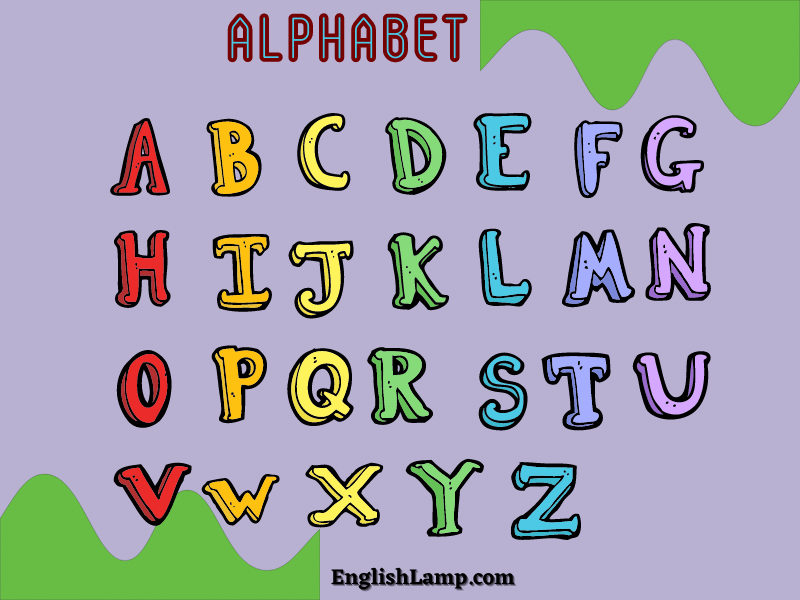The English alphabet consists of 26 letters arranged in a definite order as A, B, C, D, etc. Those letters are commonly used, and we call them the Standard Alphabet. All official communication nowadays uses this widely used and acknowledged alphabet.
Letters in the English Alphabet
The alphabet of any language in the world that we use to communicate has a set of symbols we use to represent speech in writing. Those symbols are called letters. These letters are combined in a proper manner to make words, and we use these words to form sentences in daily life communication. We call those symbols letters.
The English language is script-based. Each letter forms a particular shape. The modern English alphabet is in the Latin script, which is the main set of letters. When these letters are arranged in a specific sequence, it is called the alphabet.
Standard English Alphabet
These letters can be written in
- capital, and
- small.
We will examine each of these topics individually.
Capital Letters in the Alphabet
 First, we shall see how we can write capital letters.
First, we shall see how we can write capital letters.
Have a look.
Click the audio button to listen.
- A, B, C, D, E, F, G,
- H, I, J, K, L, M, N, O, P,
- Q, R, S, T, U, V, W,
- X, Y, Z
Small Letters
We can also write these in small letters.
Have a look.
- a, b, c, d, e, f, g,
- h, i, j, k, l, m, n, o, p,
- q, r, s, t, u, v, w,
- x, y, z.
Capital Letters and Their Corresponding Small Letters
It is well known that we can write each letter of the English alphabet in capital and small letters. Below, you can see the alphabet in capital and small letters. Sometimes, we call capital letters ‘uppercase’ and small letters ‘lowercase’.
These 26 capital letters and their corresponding small letters are:
Letter Number | Capital | Small | Pronunciation |
1 | A | a | |
2 | B | b | |
3 | C | c | |
4 | D | d | |
5 | E | e | |
6 | F | f | |
7 | G | g | |
8 | H | h | |
9 | I | i | |
10 | J | j | |
11 | K | k | |
12 | L | l | |
13 | M | m | |
14 | N | n | |
15 | O | o | |
16 | P | p | |
17 | Q | q | |
18 | R | r | |
19 | S | s | |
20 | T | t | |
21 | U | u | |
22 | V | v | |
23 | W | w | |
24 | X | x | |
25 | Y | y | |
26 | Z | z |
Learn to pronounce letters in the English alphabet by listening to audio.
More About the English Alphabet
- The Old English alphabet had 29 letters. They were A, B, C, D, E, F, G, H, I, K, L, M, N, O, P, Q, R, S, T, V, X, Y, Z, &, ⁊, Ƿ, Þ, Ð, and Æ
- The letters ⁊, Ƿ, Þ, Ð, and Æ are dropped
- Three letters, J, U, and W, were added in the 16th century
- The modern alphabet consists of 26 letters, 23 from the old alphabet and three added later
- The English alphabet consisted of 27 letters until 1835. It was an ampersand (&), written after the letter Z
Frequently Asked Questions
1. What are the 26 letters of the alphabet?
There are 26 letters in the English alphabet, and those are A, B, C, D, E, F, G, H, I, J, K, L, M, N, O, P, Q, R, S, T, U, V, W, X, Y, and Z.
2. What is the 27th letter in the alphabet?
The 27th letter in the alphabet is an ampersand (&).
3. What is the oldest letter?
Even though it is being used today, the letter ‘O’ is the oldest. Almost sixty-five of the world’s alphabets make use of this letter, which first appeared in the Finnish alphabet nearly 1,300 years ago.
4. Who discovered the English alphabet?
Nobody can claim credit for developing the English alphabet. It evolved through the years from the Greek alphabet, which it borrowed from the Romans.
5. Which alphabet do we use in English today?
Currently, the modern English alphabet is used by the majority of English-speaking countries. People have been using this since the 17th and 18th centuries.
| Related Links | |
| Use of letters | Persons |
| Gender | Number |
| Vowels and consonants | State of being |
All Lessons of Listening Grammar